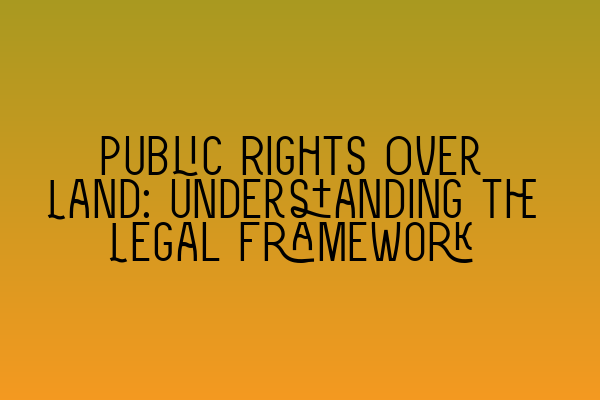Public Rights Over Land: Understanding the Legal Framework
As a prominent solicitor specializing in property law and land law at SQE Property Law & Land Law, I am frequently asked about public rights over land. Public rights over land are an integral part of the legal framework governing property ownership and usage. Understanding these rights is crucial for individuals and businesses alike, as it impacts how land can be accessed and utilized. In this blog post, I will delve into the legal intricacies surrounding public rights over land, providing you with a comprehensive overview.
What are Public Rights Over Land?
Public rights over land refer to the legal entitlements that members of the public have in relation to certain properties or areas of land. These rights are usually conferred by law and can include rights of way, easements, access to natural resources, and even recreational privileges. Public rights over land are designed to strike a balance between individual property rights and the needs and interests of the wider public.
Understanding the Types of Public Rights Over Land
1. Rights of Way: One of the most common forms of public rights over land is the right of way. This grants individuals the legal right to access or cross another person’s property. There are various types of rights of way, including footpaths, bridleways, and highways. It is important to note that rights of way can be public or private, and their existence may be documented in legal agreements or established through long-standing usage.
2. Easements: Easements are another essential aspect of public rights over land. Essentially, an easement is a right to use or access another person’s land for a specific purpose. This could include rights such as the right to install and maintain utility services, the right to access adjacent properties, or the right to receive a flow of natural resources such as water. Easements are typically created through legal agreements or imposed by law to serve the overall public interest.
3. Access to Natural Resources: In certain situations, the public may be entitled to access and utilize natural resources located on private land. This can include rights to fish in rivers, gather firewood from designated areas, or even extract minerals or other valuable resources. These rights are often subject to specific regulations and restrictions to ensure sustainable usage and the protection of the environment.
Public Rights Over Land and Planning Permissions
It is important to recognize that public rights over land can intersect with planning permissions. Local planning authorities must consider public rights when granting or denying planning permission for development projects. This is particularly relevant when proposed developments may impact public rights, such as rights of way or access to natural resources. Therefore, it is crucial for property owners and developers to engage in thorough due diligence to identify and navigate any potential conflicts or restrictions imposed by public rights over land.
Resolving Disputes and Protecting Public Rights
As with any legal matter, disputes can arise concerning public rights over land. If you find yourself involved in a dispute related to public rights, it is advisable to seek legal advice promptly. A solicitor with expertise in property law and land law can guide you through the dispute resolution process, ensuring that your rights are protected and that the matter is resolved in accordance with the law.
Conclusion
Public rights over land form an essential part of the legal framework governing property ownership and usage. Understanding the different types of public rights, such as rights of way, easements, and access to resources, is crucial for both individuals and businesses. Whether you are a landowner, developer, or member of the public, being aware of public rights over land can help ensure that you navigate the legal landscape effectively and protect your rights.
If you would like to further enhance your understanding of property law and land law in preparation for the SRA’s SQE exams, SQE 1 Practice Exam Questions and SQE 1 Practice Mocks FLK1 FLK2 are valuable resources to consider. Additionally, SQE 1 and SQE 2 Preparation Courses can provide comprehensive guidance to help you excel in these exams. Stay informed about upcoming exam dates by checking the SRA SQE Exam Dates.
Remember, having a clear understanding of public rights over land is crucial for any individual or business dealing with property transactions or land disputes. By familiarizing yourself with the legal framework surrounding public rights over land, you can make informed decisions and protect your interests effectively.
